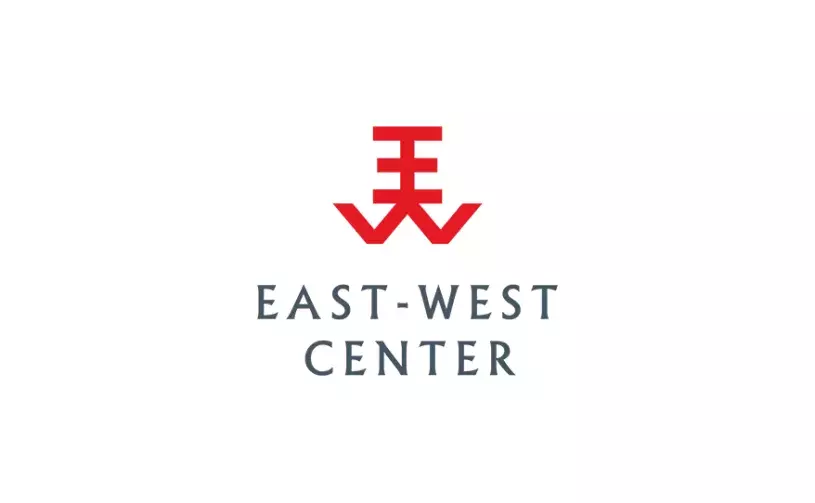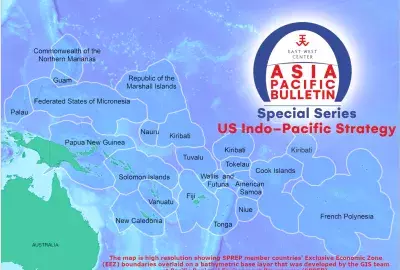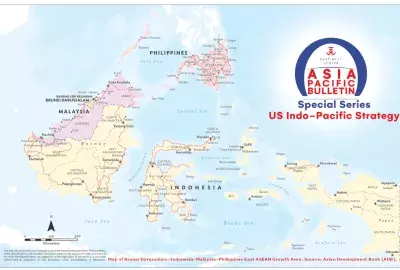Error message

|
Richard Herr, Academic Director of Parliamentary Law at the University of Tasmania, explains that “Ironically, the ‘new normal’ is likely to be business as usual for the PICTs.” |
Finding a “new normal” has become a ubiquitous catchphrase expressing the hope that the instability and uncertainties of the Covid-19 pandemic will end soon. The concept describes either a temporary transitional state on the way back to an old pre-Covid normal or the altered reality of a transformed post-Covid order.
For the Pacific Community’s 21 Pacific Island countries and territories (PICTs), their post-Covid options will be determined more by the choices made elsewhere than by their own preferences. Ironically, their new normal is likely to be business as usual for the PICTs. External influences have limited the extent to which they can control own their fate for centuries.
The course of the current pandemic illustrates this. The states of the region responded to the threat of infection in much the same way as responsible, larger states elsewhere and, in most cases, more swiftly. Most shut their borders, closed schools, imposed shelter at home regimes and quarantined the infected. And, at time of writing, these measures appear to have worked.
From the declaration of a pandemic, only 6 of the 21 PICTs – (Commonwealth of the Northern Marianas (CNMI), Papua New Guinea (PNG), Fiji, French Polynesia, Guam and New Caledonia) – have had reportable cases with very few deaths. By of 27th May, just two – the CNMI and Guam – have had a case within the incubation period of 14 days. The other four have not had a reportable case within at least one, and most more than two, incubation periods.
Without minimizing the heroic efforts made by the PICTs, arguably much of this success would have been imposed on the region had the Islands not reacted. Travel across the region was cut off at source. Almost immediately flights into the region were cut to nothing and cruise ships stopped sailing. Quarantine on travelers at transit or entry points into the region discouraged using what access was available.
Notwithstanding that the pandemic is first and foremost a health crisis, the PICTs’ success with containing the health threat has made the collateral damage to their economies vastly more significant on the ground. Whereas extra-regional actions tended to reinforce the region’s health security these same actions were significantly less supportive economically.
Travel and quarantine restrictions impacted on remittances and trade income while the pandemic-induced economic cutbacks undermined the demand for the region’s exports. Reduced trade even threatened food security as many islands depend on imports for basic food stuffs.
The PICTs Economic New Normal
The pandemic has hit the Island economies hard due to their high reliance on grants, tourism, and international trade. Job losses in the tourism sector are devastating for Fiji, Palau and Vanuatu and significant for many others especially states like Samoa and Tonga where “friends and relatives” visits help to keep the small connecting airline routes viable.
Virtually all PICTs have been obliged to pursue fiscal stimulus packages to address the domestic hardships of lost external income. Consequently, the IMF estimates that average public debt against GDP across the region has risen to a level that has undone three years of debt decline.
A new economic normal is the specific aid arrangements for meeting the cost of Covid. Bilateral sources including especially Australia and New Zealand and multilateral sources such ADB, IMF and World Bank have made special pandemic financial support available to help maintain the Island economies. The G20 have announced a debt standstill to reduce the burden of loan repayments for this year. However, this is only transitional support as post-Covid support is far from guaranteed. Rising levels of debt in traditional aid sources are expected to make financial assistance tighter in future. A new post-Covid transitional normal will likely involve re-prioritizing regional development goals.
An emergent transitional new economic normal is the search for a secure, contagion-free “bubble”. This would enable eligible states to travel and trade almost as fully “as before”. Australia and New Zealand have plans to create one between themselves and Fiji has been lobbying for inclusion. Their current Covid status could make virtually all the other PICTs eligible. There are constraints on an Oceanic bubble, however. Samoa has put conditions on joining which Fiji has found unacceptable. Other states may want reservations not acceptable to other participants in the proposed bubble. An economic question hangs over how large a bubble would have to be for viability.
The PICTs Health New Normal
Covid-19 is the fifth virus epidemic this century [Zika-2015; MERS-2012; swine flu 2009 and SARS 2002]. Medical authorities in the Pacific Islands therefore will hope inter alia there is a new normal in wider public appreciation of sanitation and social responsibility in dealing with disease. Other consequences may be less clear.
To date, Covid has not fully tested the medical resilience or the existing health security of the region. Despite initial concerns, major benefactors were able to rush medical equipment and supplies to the region to meet critical shortages. Donors were able to address the regional health crisis in a standard way notwithstanding the transport difficulties and closed borders. Use of the Pacific Islands Forum’s 2018 Boe Declaration to establish “The Pacific Humanitarian Pathway on COVID-19” has been innovative. This project to provide aid “in a timely, safe, effective and equitable manner” could be a welcome transformational new normal especially were it necessary to triage priorities in a future overwhelming medical disaster. Clearing the backlog of deferred medical needs will be, unfortunately, a short-term post-Covid continuing normal. Regrettably, the important voluntary contributions NGOs such as Interplast make toward addressing regional needs will not necessarily restart immediately due to pent up demand in their home countries. The pandemic may hasten upgrading the region’s internet system to improve telehealth capacity and, ultimately, telemedicine. Rapid sharing of diagnostic information and advice across all the remote clinics and nursing stations in almost exclusively archipelagic region is vital at any time but essential in a pandemic. This would be a transformational new normal if the opportunity is seized.
Western fears that the PRC is using Covid-based “mask diplomacy” to shape a new geopolitical normal has been allayed substantially by the limited need for this aid. Sadly, by reinforcing local perceptions that no country gives humanitarian aid without an agenda, the debate itself diminishes the political returns from medical diplomacy for every donor.
Regardless of transitional and transformational “new normals”, the pandemic has not changed the PICTs’ view that the region’s existential threat still remains climate change. That is not a new normal.
|
Richard Herr, Academic Director of Parliamentary Law at the University of Tasmania, explains that “Ironically, the ‘new normal’ is likely to be business as usual for the PICTs.” |
Finding a “new normal” has become a ubiquitous catchphrase expressing the hope that the instability and uncertainties of the Covid-19 pandemic will end soon. The concept describes either a temporary transitional state on the way back to an old pre-Covid normal or the altered reality of a transformed post-Covid order.
For the Pacific Community’s 21 Pacific Island countries and territories (PICTs), their post-Covid options will be determined more by the choices made elsewhere than by their own preferences. Ironically, their new normal is likely to be business as usual for the PICTs. External influences have limited the extent to which they can control own their fate for centuries.
The course of the current pandemic illustrates this. The states of the region responded to the threat of infection in much the same way as responsible, larger states elsewhere and, in most cases, more swiftly. Most shut their borders, closed schools, imposed shelter at home regimes and quarantined the infected. And, at time of writing, these measures appear to have worked.
From the declaration of a pandemic, only 6 of the 21 PICTs – (Commonwealth of the Northern Marianas (CNMI), Papua New Guinea (PNG), Fiji, French Polynesia, Guam and New Caledonia) – have had reportable cases with very few deaths. By of 27th May, just two – the CNMI and Guam – have had a case within the incubation period of 14 days. The other four have not had a reportable case within at least one, and most more than two, incubation periods.
Without minimizing the heroic efforts made by the PICTs, arguably much of this success would have been imposed on the region had the Islands not reacted. Travel across the region was cut off at source. Almost immediately flights into the region were cut to nothing and cruise ships stopped sailing. Quarantine on travelers at transit or entry points into the region discouraged using what access was available.
Notwithstanding that the pandemic is first and foremost a health crisis, the PICTs’ success with containing the health threat has made the collateral damage to their economies vastly more significant on the ground. Whereas extra-regional actions tended to reinforce the region’s health security these same actions were significantly less supportive economically.
Travel and quarantine restrictions impacted on remittances and trade income while the pandemic-induced economic cutbacks undermined the demand for the region’s exports. Reduced trade even threatened food security as many islands depend on imports for basic food stuffs.
The PICTs Economic New Normal
The pandemic has hit the Island economies hard due to their high reliance on grants, tourism, and international trade. Job losses in the tourism sector are devastating for Fiji, Palau and Vanuatu and significant for many others especially states like Samoa and Tonga where “friends and relatives” visits help to keep the small connecting airline routes viable.
Virtually all PICTs have been obliged to pursue fiscal stimulus packages to address the domestic hardships of lost external income. Consequently, the IMF estimates that average public debt against GDP across the region has risen to a level that has undone three years of debt decline.
A new economic normal is the specific aid arrangements for meeting the cost of Covid. Bilateral sources including especially Australia and New Zealand and multilateral sources such ADB, IMF and World Bank have made special pandemic financial support available to help maintain the Island economies. The G20 have announced a debt standstill to reduce the burden of loan repayments for this year. However, this is only transitional support as post-Covid support is far from guaranteed. Rising levels of debt in traditional aid sources are expected to make financial assistance tighter in future. A new post-Covid transitional normal will likely involve re-prioritizing regional development goals.
An emergent transitional new economic normal is the search for a secure, contagion-free “bubble”. This would enable eligible states to travel and trade almost as fully “as before”. Australia and New Zealand have plans to create one between themselves and Fiji has been lobbying for inclusion. Their current Covid status could make virtually all the other PICTs eligible. There are constraints on an Oceanic bubble, however. Samoa has put conditions on joining which Fiji has found unacceptable. Other states may want reservations not acceptable to other participants in the proposed bubble. An economic question hangs over how large a bubble would have to be for viability.
The PICTs Health New Normal
Covid-19 is the fifth virus epidemic this century [Zika-2015; MERS-2012; swine flu 2009 and SARS 2002]. Medical authorities in the Pacific Islands therefore will hope inter alia there is a new normal in wider public appreciation of sanitation and social responsibility in dealing with disease. Other consequences may be less clear.
To date, Covid has not fully tested the medical resilience or the existing health security of the region. Despite initial concerns, major benefactors were able to rush medical equipment and supplies to the region to meet critical shortages. Donors were able to address the regional health crisis in a standard way notwithstanding the transport difficulties and closed borders. Use of the Pacific Islands Forum’s 2018 Boe Declaration to establish “The Pacific Humanitarian Pathway on COVID-19” has been innovative. This project to provide aid “in a timely, safe, effective and equitable manner” could be a welcome transformational new normal especially were it necessary to triage priorities in a future overwhelming medical disaster. Clearing the backlog of deferred medical needs will be, unfortunately, a short-term post-Covid continuing normal. Regrettably, the important voluntary contributions NGOs such as Interplast make toward addressing regional needs will not necessarily restart immediately due to pent up demand in their home countries. The pandemic may hasten upgrading the region’s internet system to improve telehealth capacity and, ultimately, telemedicine. Rapid sharing of diagnostic information and advice across all the remote clinics and nursing stations in almost exclusively archipelagic region is vital at any time but essential in a pandemic. This would be a transformational new normal if the opportunity is seized.
Western fears that the PRC is using Covid-based “mask diplomacy” to shape a new geopolitical normal has been allayed substantially by the limited need for this aid. Sadly, by reinforcing local perceptions that no country gives humanitarian aid without an agenda, the debate itself diminishes the political returns from medical diplomacy for every donor.
Regardless of transitional and transformational “new normals”, the pandemic has not changed the PICTs’ view that the region’s existential threat still remains climate change. That is not a new normal.







